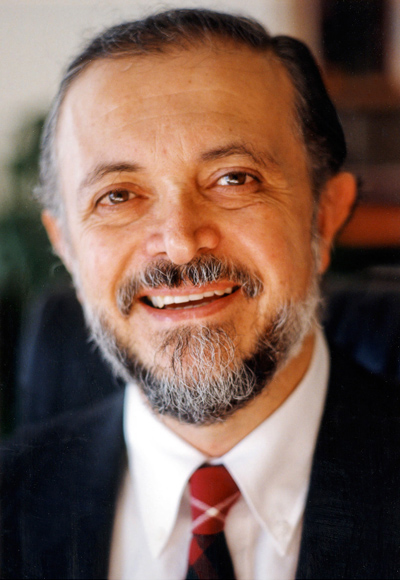By:
- Kim McDonald
Published Date
By:
- Kim McDonald
Share This:
Mario J. Molina, Chemistry, 1995

Mario J. Molina. Photo by Donna Coveney/MIT
Mario J. Molina’s move from the Massachusetts Institute of Technology to UC San Diego in 2004 provided him with two important advantages: First, he was able to join a world-renowned group of atmospheric scientists that included Paul Crutzen, with whom he shared the 1995 Nobel Prize in Chemistry. Second, as the only Mexican-born Nobel laureate in science and one who has become increasingly interested in developing ways to mitigate the air quality problems of major cities around the world, his move to La Jolla put him closer to a science policy center he established in Mexico City.
Molina, who received the Nobel Prize for his work with F. Sherwood Rowland of UC Irvine in elucidating the threat posed to the Earth’s ozone layer by chlorofluorocarbon gases, or CFCs, has been conducting a long-term study of atmospheric particulates in Mexico City in hopes of developing ways to mitigate the air pollution there. At his Center for Strategic Research on Energy and the Environment in Mexico City, he and his colleagues “carry out science policy studies related to energy and to the climate change issue aimed at impacting public policies in Mexico and in Latin America.”
Current Faculty Nobel Laureates
Molina’s home base in San Diego, meanwhile, has enabled him to look more closely at air quality problems in the U.S.-Mexico border region with the goal of providing nations with more information on how atmospheric pollutants travel across foreign borders and where these long range pollutants are coming from. A study he recently conducted in the border region of Imperial County, for example, found that, contrary to popular belief, much of the air pollution that flows across the U.S.-Mexico border comes from the United States, not Mexico.
In addition, Molina has been spending much of his time providing advice on environmental and science policy to President Barack Obama and the President of Mexico. Since April 2011, he has been one of 21 scientists serving on President Obama´s Committee of Advisors in Science and Technology, or PCAST. A professor of chemistry and biochemistry in the department of chemistry who is also a professor at the Center for Atmospheric Sciences at Scripps Institution of Oceanography, Molina provides policy advice as a member of both the National Academy of Sciences and the Institute of Medicine on problems of climate change and has promoted global actions in favor of sustainable development.
Share This:
You May Also Like
Stay in the Know
Keep up with all the latest from UC San Diego. Subscribe to the newsletter today.



